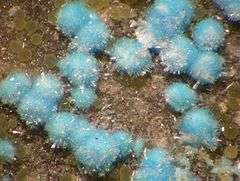Nevadaite
| Nevadaite | |
|---|---|
|
Nevadaite - radial habit. Attribution: Leon Hupperichs | |
| General | |
| Category | Phosphate minerals |
| Formula (repeating unit) | see text |
| Strunz classification | 8.DC.60 |
| Crystal system | Orthorhombic |
| Crystal class |
Disphenoidal (222) H-M symbol: (2 2 2) |
| Space group | P21mn |
| Unit cell |
a = 12.123 Å b = 18.999 Å c = 4.961 Å; Z = 1 |
| Identification | |
| Color | Pale Green, turquoise |
| Crystal habit | Acicular, crystalline, radial |
| Cleavage | None |
| Fracture | Conchoidal |
| Mohs scale hardness | 3 |
| Luster | Vitreous |
| Streak | pale blue |
| Diaphaneity | Translucent |
| Specific gravity | 2.54 |
| Optical properties | Biaxial (-) |
| References | [1] |
Nevadaite is a rare phosphate mineral with a chemical formula[2] of
| Cu2Zn0.02V3+0.98Al1.15Al8P7.9O32F8.37(OH)1.63(H2O)21.65 |
Characteristics
Nevadaite is a pale-green to turquoise colored mineral belonging to the phosphate group. It exhibits a radial crystal habit consisting of prismatic crystals covering areas up to 2 cm. It has a pale-blue streak, a vitreous luster, and is not fluorescent. Nevadaite is in the orthorhombic crystal system and displays conchoidal fracture.[1]
Location

Nevadaite was first discovered in the Gold Quarry mine near the town of Carlin, Eureka County, Nevada.[3] The unique conditions and amounts of phosphate, vanadate, arsenate, and uranate in this area led to the formation of two new minerals; one being nevadaite and the other being goldquarryite. The Gold Quarry mine has been operated by The Newmont Mining Corporation since 1985 for the extraction of Carlin-type gold deposits.[2]
Nevadaite was discovered in February 1992 by Martin C. Jensen and was approved by the International Mineralogical Association in 2002.[2] It is also found in a copper mine in Kyrgyzstan.
References
- 1 2 "Nevadaite Mineral Data". webmineral.com. Retrieved 2015-12-03.
- 1 2 3 "Nevadaite". Canadian Mineralogist. 42: 741–752. 2004.
- ↑ "Nevadaite: Nevadaite mineral information and data.". www.mindat.org. Retrieved 2015-12-03.
